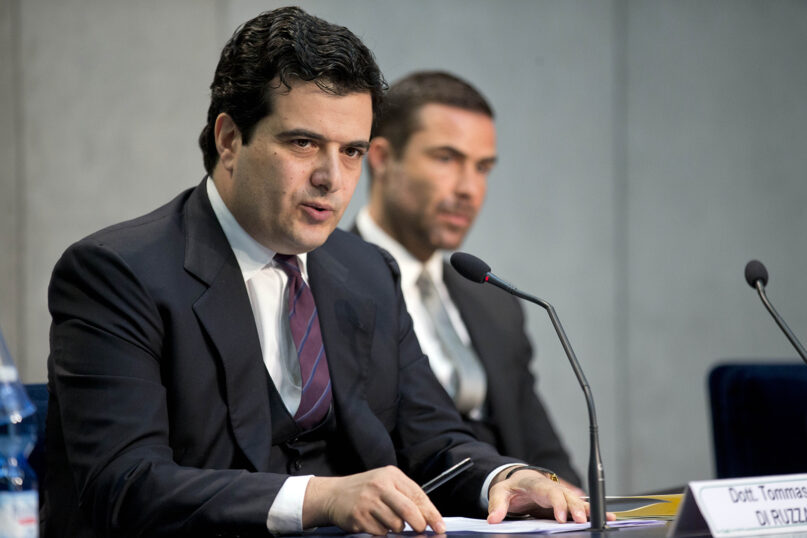VATICAN CITY (RNS) — Testifying at the massive trial resulting from the Vatican’s latest financial scandal Wednesday (April 27), the former director of the Catholic Church’s anti-money-laundering watchdog agency said Pope Francis and other high-ranking prelates backed efforts to gain sole ownership of the prime London real estate at the center of the scandal.
Tommaso Di Ruzza, who ran the entity now called the Supervisory and Financial Information Authority, known as ASIF, is charged with abuse of office for his alleged failure to flag a 2019 request by the Vatican Secretariat of State for a loan from the Vatican bank, intended to pay off $150 million in debt owed on the London apartment complex.
Di Ruzza told the Vatican judicial tribunal that Vatican higher-ups, including Francis, Secretary of State Cardinal Pietro Parolin and the Substitute Archbishop Edgar Pena Parra, were aware of the loan request and that in a March 2019 meeting, Francis voiced “the interest of the Holy See in turning a new page,” and “specifically asked to provide assistance to the Substitute.”
At the time, the Secretariat of State, which had spent more than $200 million to obtain a stake in the fund that owned the property, had asked Italian financier Gianluigi Torzi to help it gain full ownership.
Torzi ended up sequestering 1,000 voting shares of the fund for himself, which gave him ultimate control over the property, and requested $17 million to relinquish them. Vatican prosecutors claim his demand qualifies as extortion. After the Secretariat paid Torzi in two installments, it turned to the Vatican bank to pay off the $150 million lien on the property.
The loan eventually came to the attention of Vatican prosecutors, who after an investigation alleged that Di Ruzza failed to perform due diligence in reviewing the loan. Vatican judges and prosecutors questioned Di Ruzza at length Wednesday on his role and oversight in the Catholic institution.
Di Ruzza testified that ASIF was not qualified at the Vatican to oversee the Secretariat of State’s finances and that the transaction did not raise red flags concerning the financing of terrorists or money laundering, which were the main concerns for his department.
He said his department became aware of the London deal in 2018 and only discovered about the payment to Torzi after the deal was signed.
“I always acted in the interest of the Holy See,” he said.
The Administration of the Patrimony of the Apostolic See, or APSA, eventually borrowed $150 million from foreign banks to extinguish the loan on the property, which the Vatican sold in January 2022.
In the several later meetings that Di Ruzza claims to have had with Vatican prelates, they allegedly “expressed the desire not to begin litigation” and strike a deal with Torzi.
RELATED: Marymount California University, a half-century-old Catholic school, to shut down
He also claimed that his department asked for clarifications regarding the loan from the Vatican security services and gendarmerie as well as other financial entities at the Vatican. Di Ruzza also told judges that his fellow defendant René Brülhart, then-president of ASIF, acted within the confines of the department’s statute.

René Brülhart talks to the media during a briefing to present the Vatican financial oversight report, at the Vatican, April 28, 2016. (AP Photo/Andrew Medichini)
Brülhart told the Vatican judges in early April that he was sure he had not committed any crime.
In what has become a routine feature of the trial, the judges again rejected a request by defense lawyers claiming that the trial is null because prosecutors have failed to return sequestered material. The defense team of financier Enrico Crasso, who managed a significant amount of Vatican assets, responded by likening the court to the Inquisition.
The Vatican trial will resume May 5, when Cardinal Angelo Becciu will testify before judges for a second time since the beginning of the proceedings. Becciu is accused of embezzlement, abuse of office and witness tampering, which he vehemently denies.
RELATED: While focusing on Ukraine, don’t forget the rest of the world





